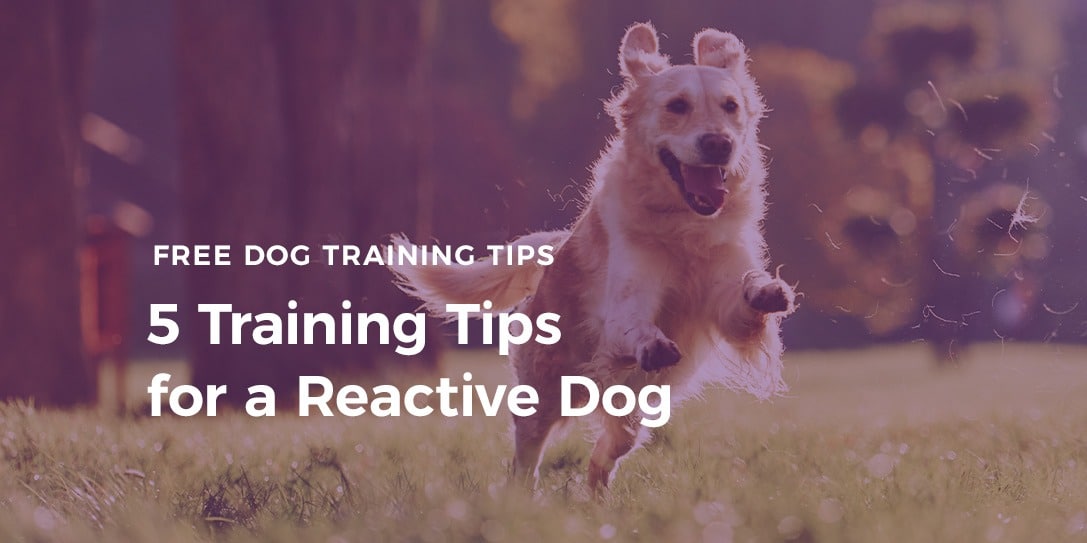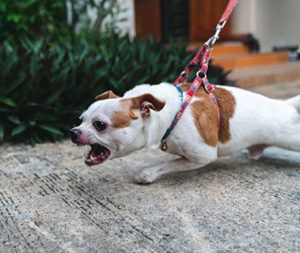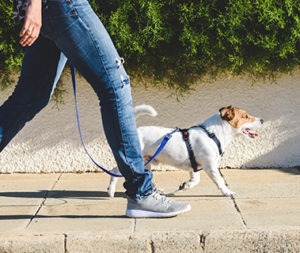
Do You Have a Reactive Dog? Here Are Our 5 Best Training Tips To Help
Your furry friend might be a reactive dog if they get overly excited, bark at passing dogs and people, or growl when feeling threatened. While this behavior can be challenging for owners, it’s important to remember that reactive dogs are still great pups at heart who need extra help to bring out their best.
Whether you’re an experienced pet parent or just getting started, this blog can help you understand what a reactive dog is, why some dogs are reactive, and why training is so important. With our top five training tips for reactive dogs, you’ll have everything you need to turn your dog into a calm, confident, and popular pup at the dog park!
 What Is a Reactive Dog, Anyway?
What Is a Reactive Dog, Anyway?
A reactive dog displays overly excited or strong behaviors in response to everyday situations, sounds, sights, and movements that other dogs would typically ignore. This could look like your dog barking and lunging at people who come to your house or at another dog when you’re out for a walk. Other reactive behaviors include:
- Jumping toward other dogs, people, or objects while on a leash
- Whining, trembling, or snapping at people or other dogs
- Barking excessively or growling at other dogs, people, bikes, or cars
- Becoming overly excited or agitated in certain situations
- Being highly sensitive to noises or sudden movements
- Urinating when approached
- Tensing up or looking away
One common misconception is that reactive dogs are aggressive. However, it is quite the opposite. Reactivity is a heightened emotional response, while aggression is hostile and harmful behavior toward another person or dog.
Why Are Some Dogs Reactive?
There are many reasons why a dog may be reactive. Some dogs are reactive due to a genetic predisposition, while others may not have received enough socialization or exposure, which can cause a stronger reaction to unfamiliar stimuli. Another common cause of reactivity is fear. Dogs who have had negative or traumatic experiences in the past can act out of anxiety.
Finally, a lack of training can also be the root cause of a dog’s reactive behavior. Dogs who have not received proper training and boundaries may become reactive because they are unsure of how to respond to certain stimuli.
 Here Are the 5 Best Tips To Train Reactive Dogs
Here Are the 5 Best Tips To Train Reactive Dogs
All dogs can benefit from training, and reactive dogs are no exception. Here are five of our best training tips for managing reactive dogs:
1. Start With the Basics
Before working on reactivity, your pup needs to have a solid foundation of basic obedience commands, such as “sit,” “stay,” and “come.” This will give you a means of communicating with your dog and redirecting their focus when they become reactive.
2. Identify Your Dog’s Specific Triggers
Every dog is unique and behaves differently in response to their triggers, and the best training program for a reactive dog is customized to them. Triggers can include other dogs, bicycles, loud noises, or even people in specific clothing. Identifying what sets your dog off is crucial to creating an effective training plan. Once you’ve identified your dog’s particular triggers, you can begin working on training and desensitization.
3. Get Your Dog Out and About!
Desensitization exposes your dog to everyday sounds and situations, such as bicycles, skateboards, cars, sirens, people laughing, and other noises. Taking your dog out into the world can expose your pup to these stimuli and help them create associations with positive experiences. Eventually, they will become more confident and relaxed in new situations. To learn more about desensitization, check out our video that shows the difference between trained and untrained dogs.
4. Keep Calm, Be Patient, and Avoid Punishment-Based Techniques
Using punishment-based techniques can escalate the situation and make reactivity worse. Instead, focus on positive reinforcement and redirect your dog’s attention.
5. Get Professional Help
Reactive dogs require special attention when it comes to training and behavior management. Professional training can help reactive dogs learn how to change their responses, get along with other dogs, and build relationships with their humans. Together, you and your dog can benefit greatly from the positive reinforcement techniques and unbiased evaluation of your dog’s reactive behaviors that a professional trainer offer.
Our private lessons are a great starting point for reactive dog training. In these one-on-one sessions, we can work on specific behaviors and address individual challenges in a safe and controlled environment. We can help you feel more confident in taking your furry companion on their daily walk or embarking on a new adventure together with compassion, consistency, and patience.
If you suspect that you may have a reactive dog or are seeking personalized training tailored to your dog’s specific needs, our quiz can help. Click here to take the quiz, and we will be in touch!
